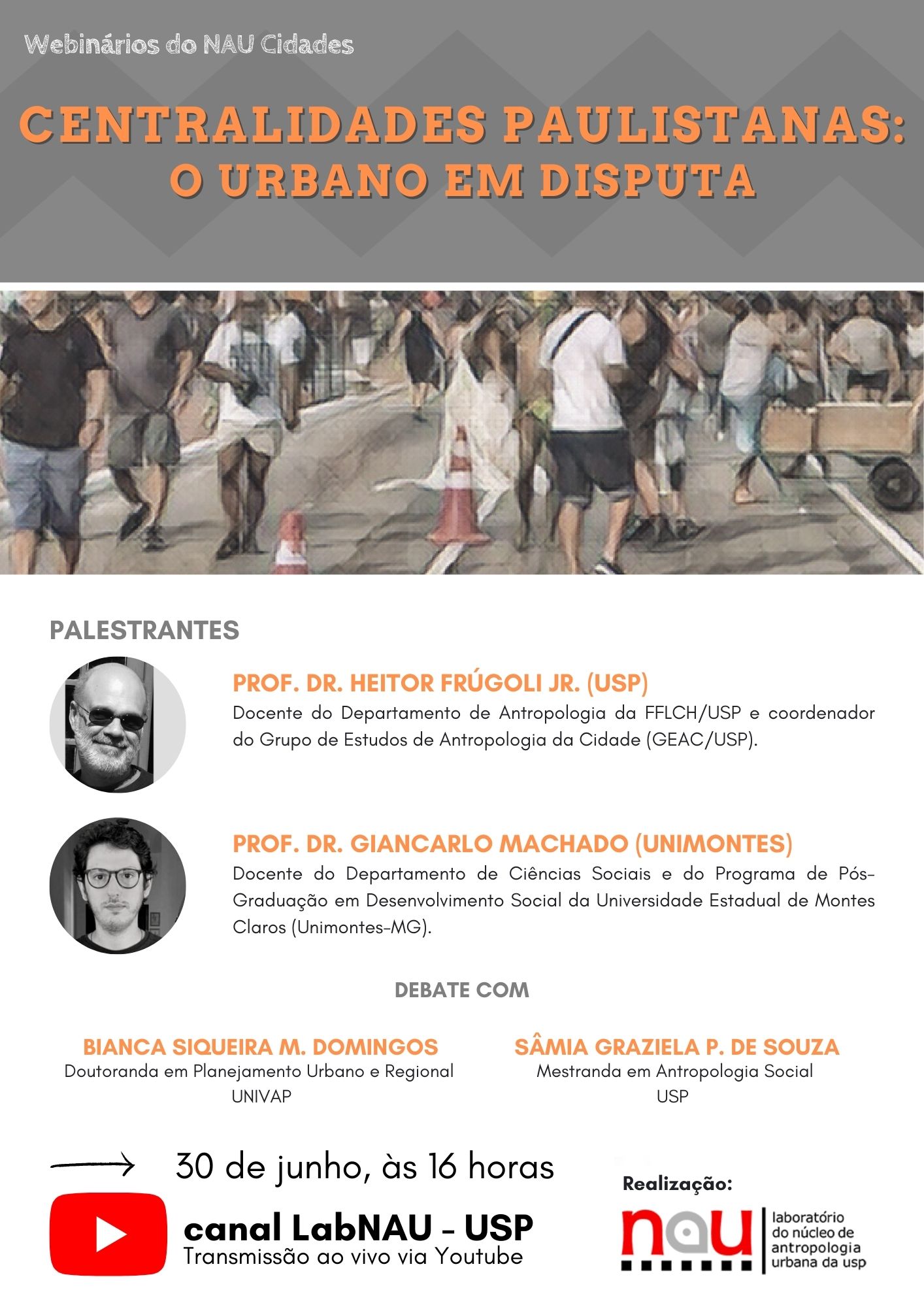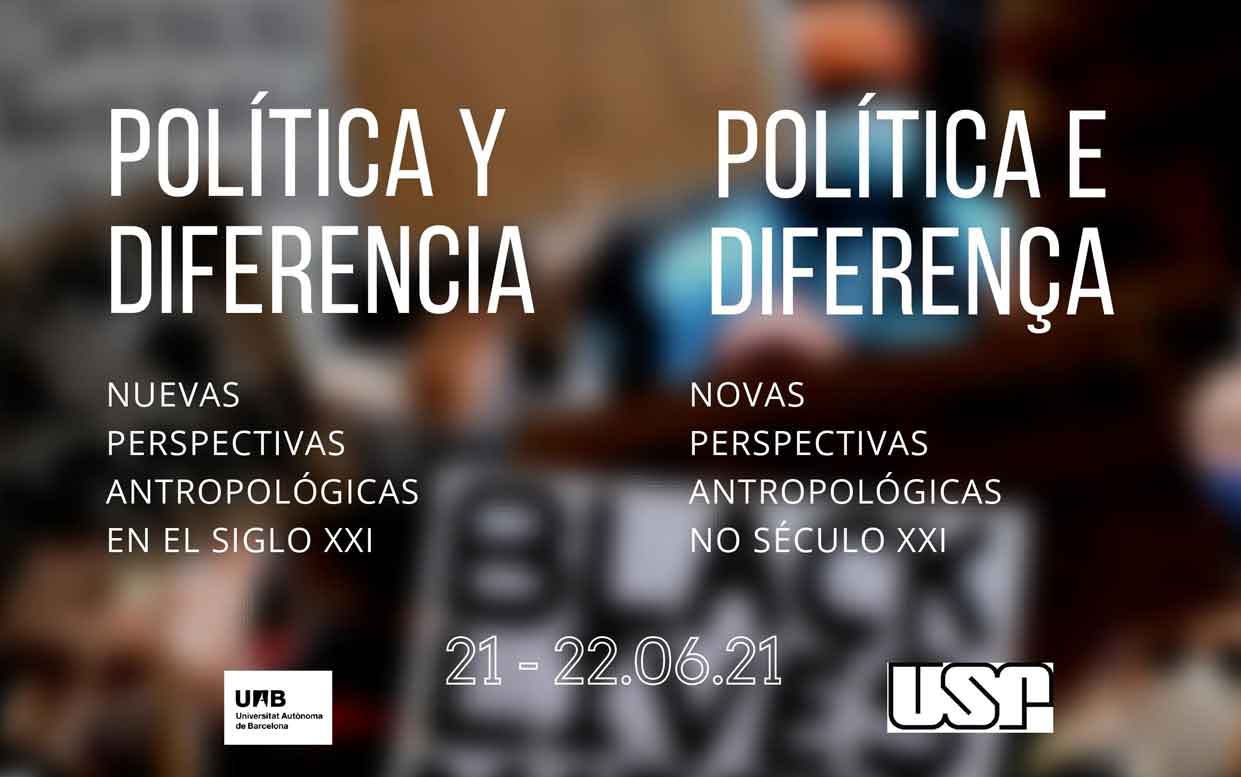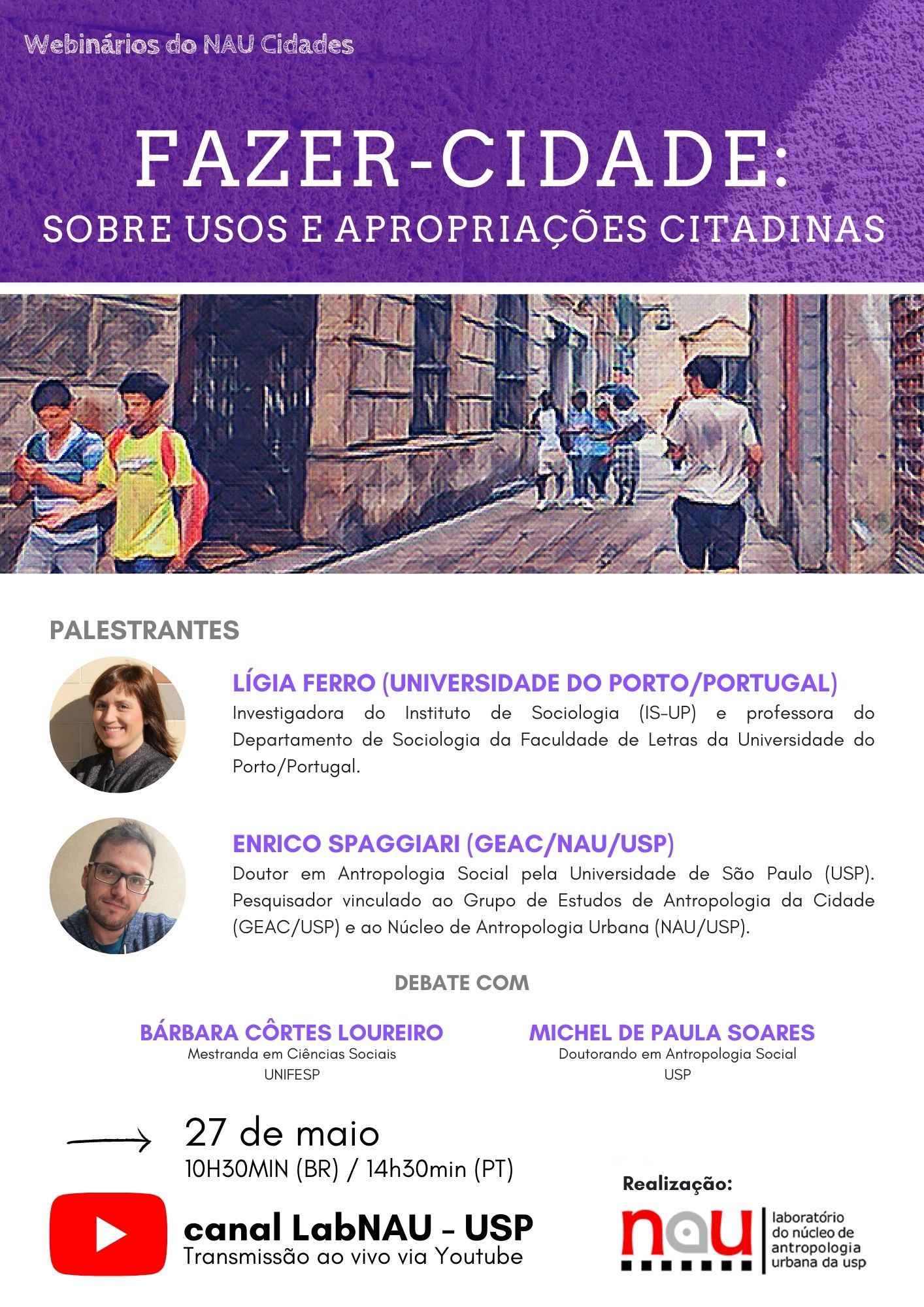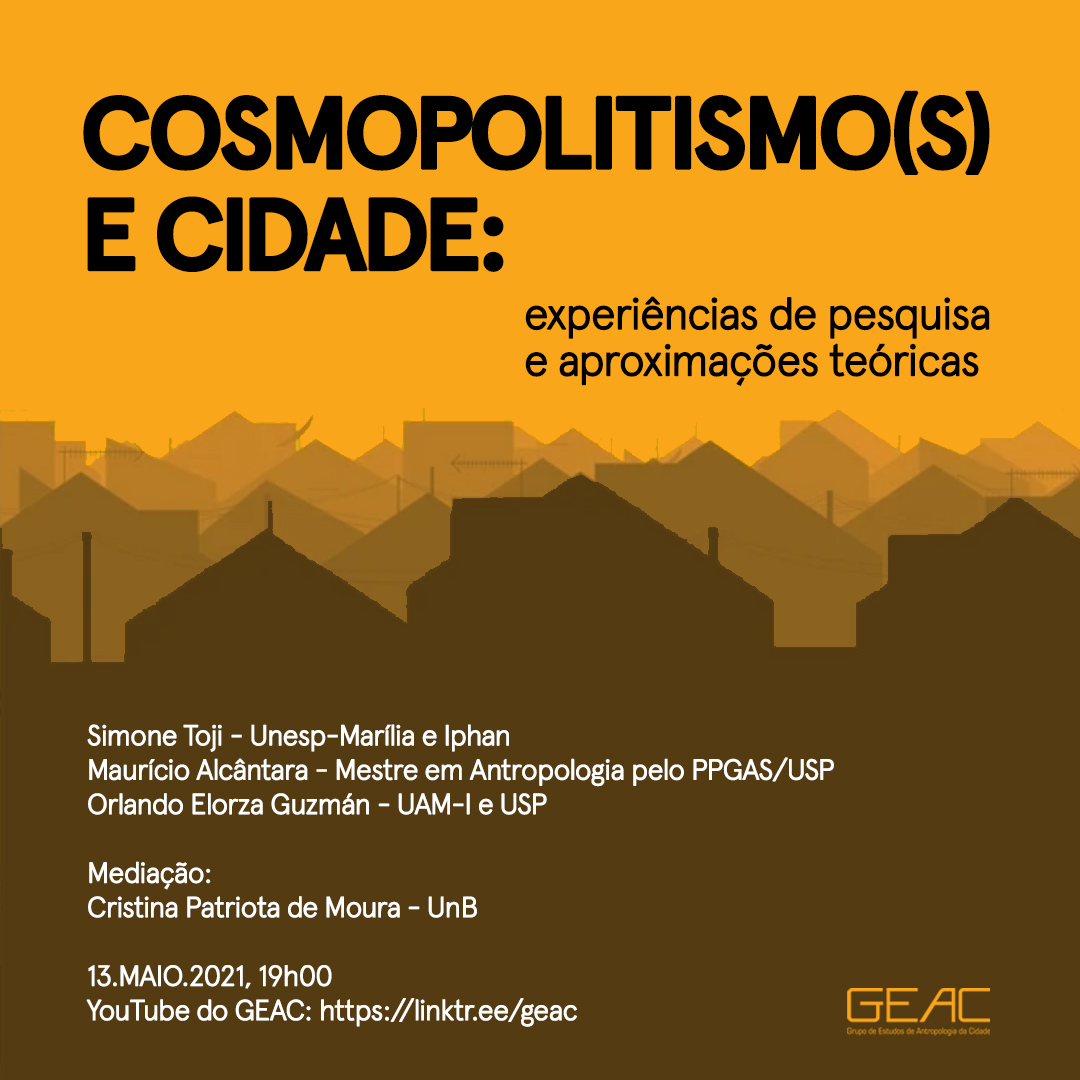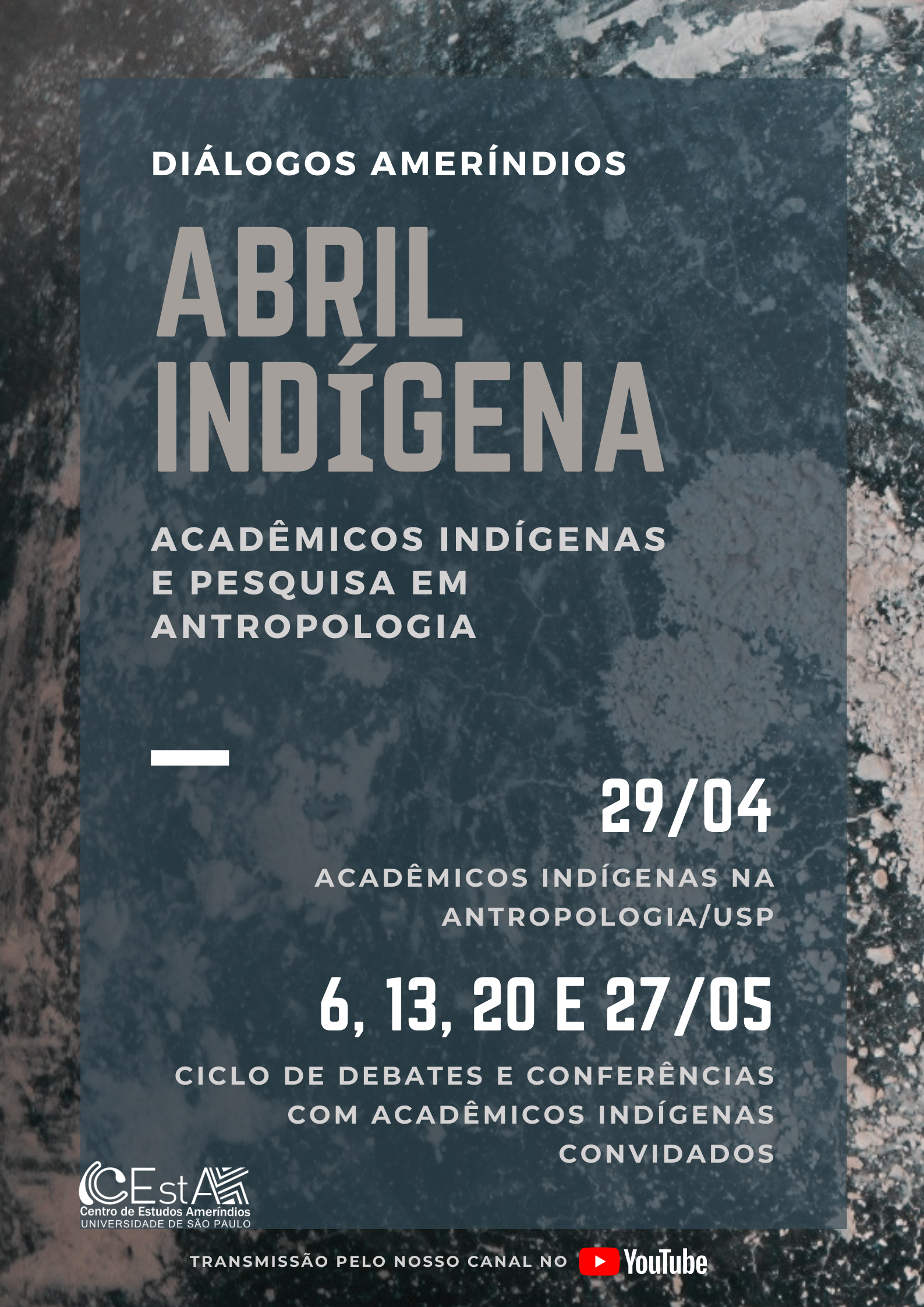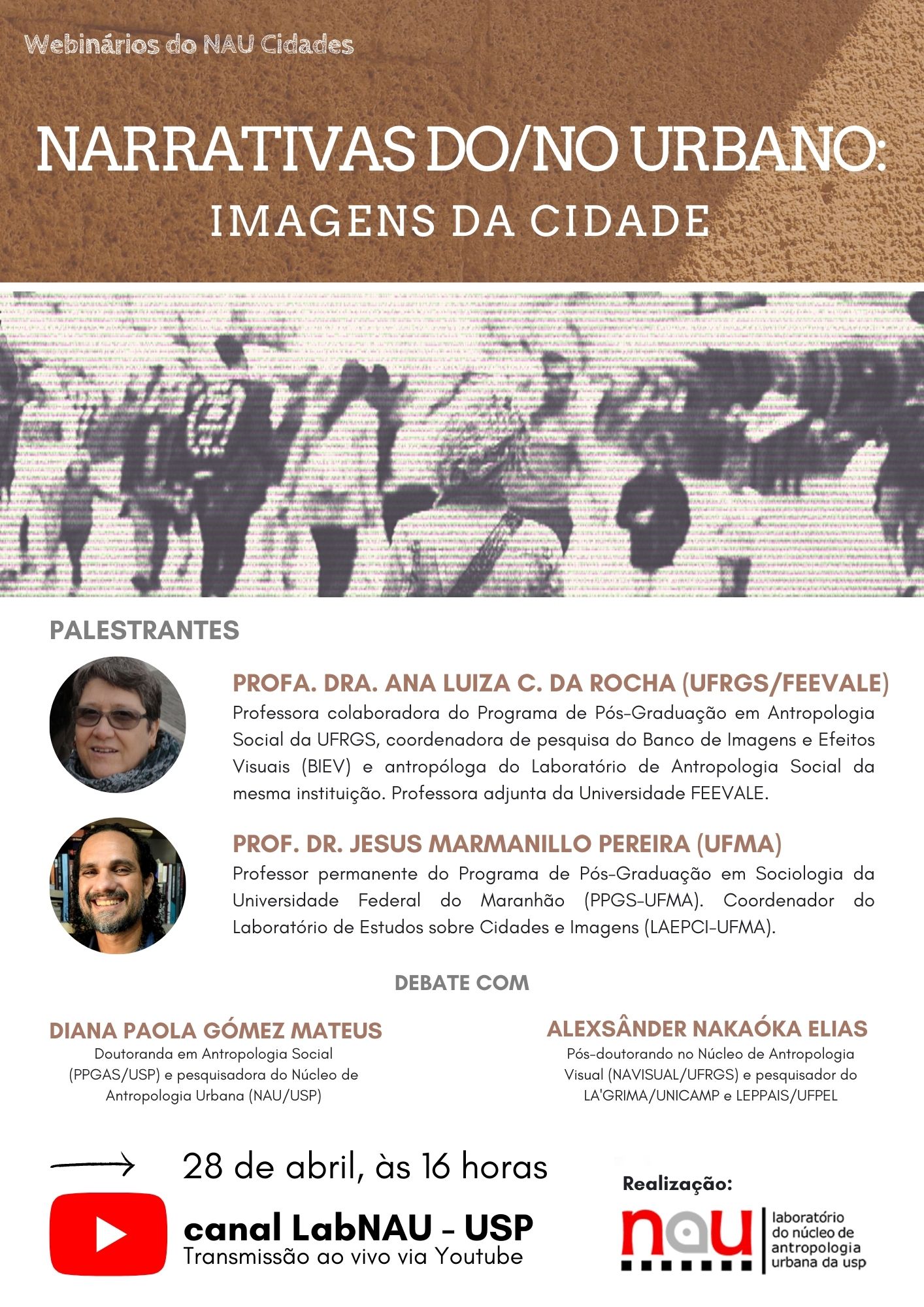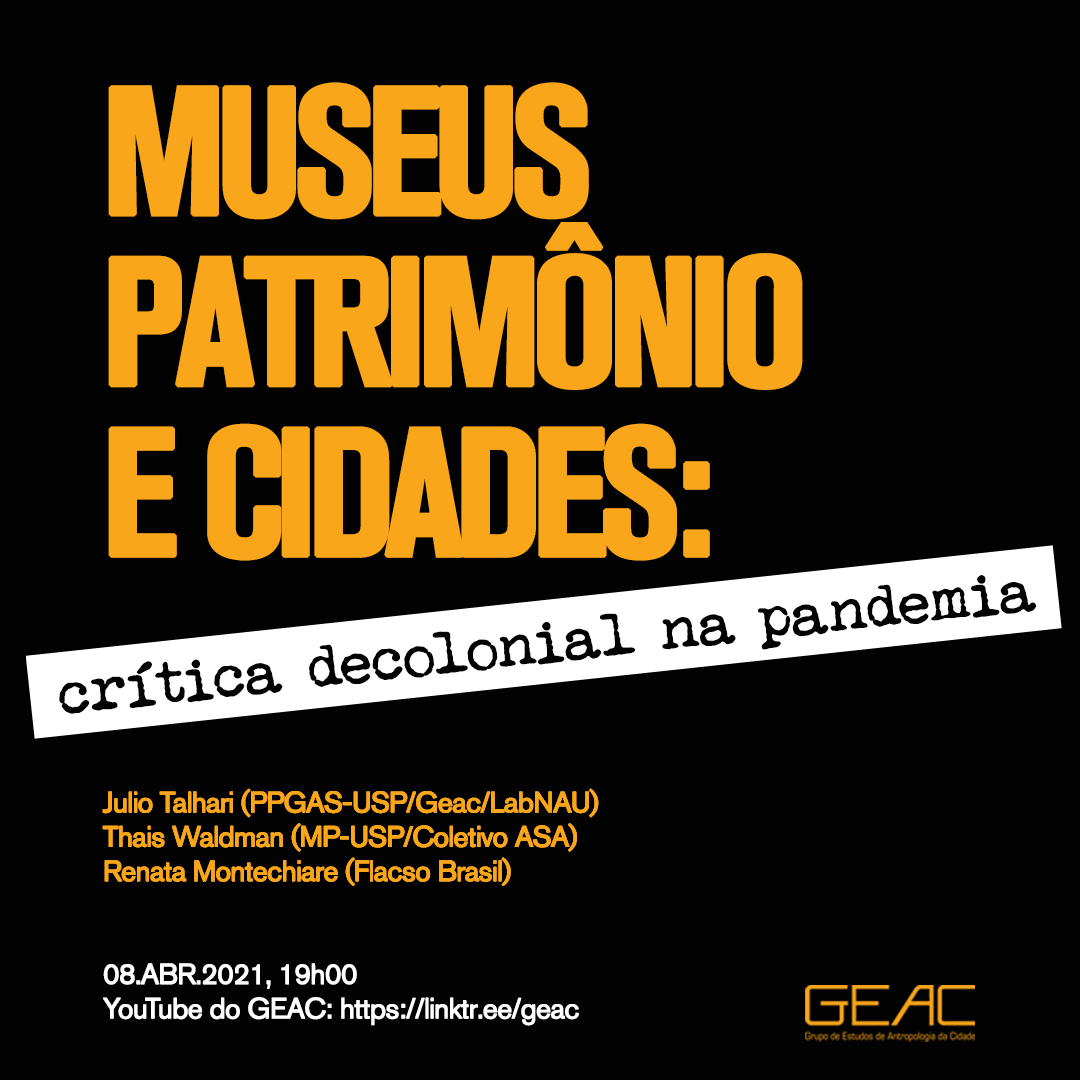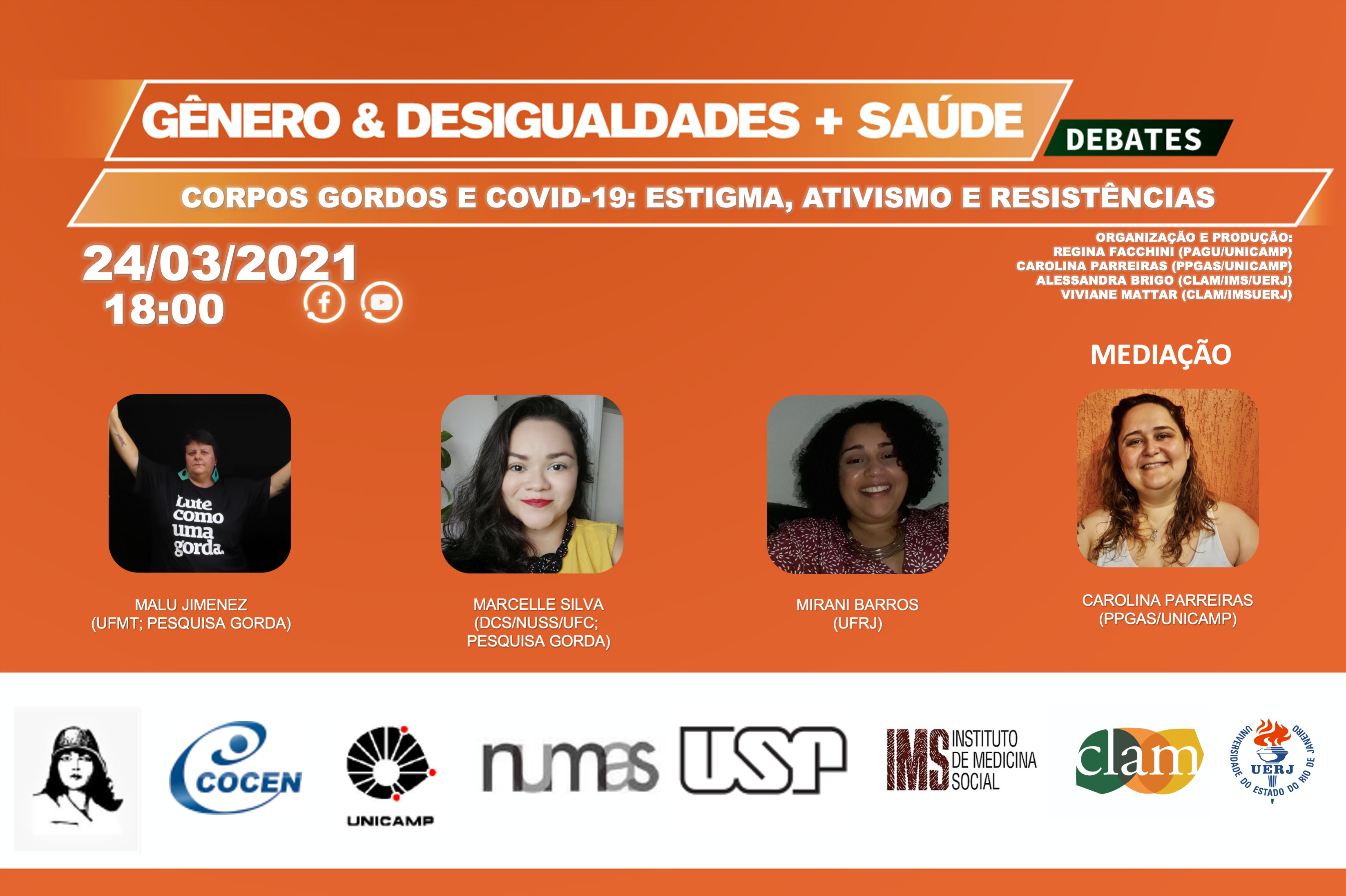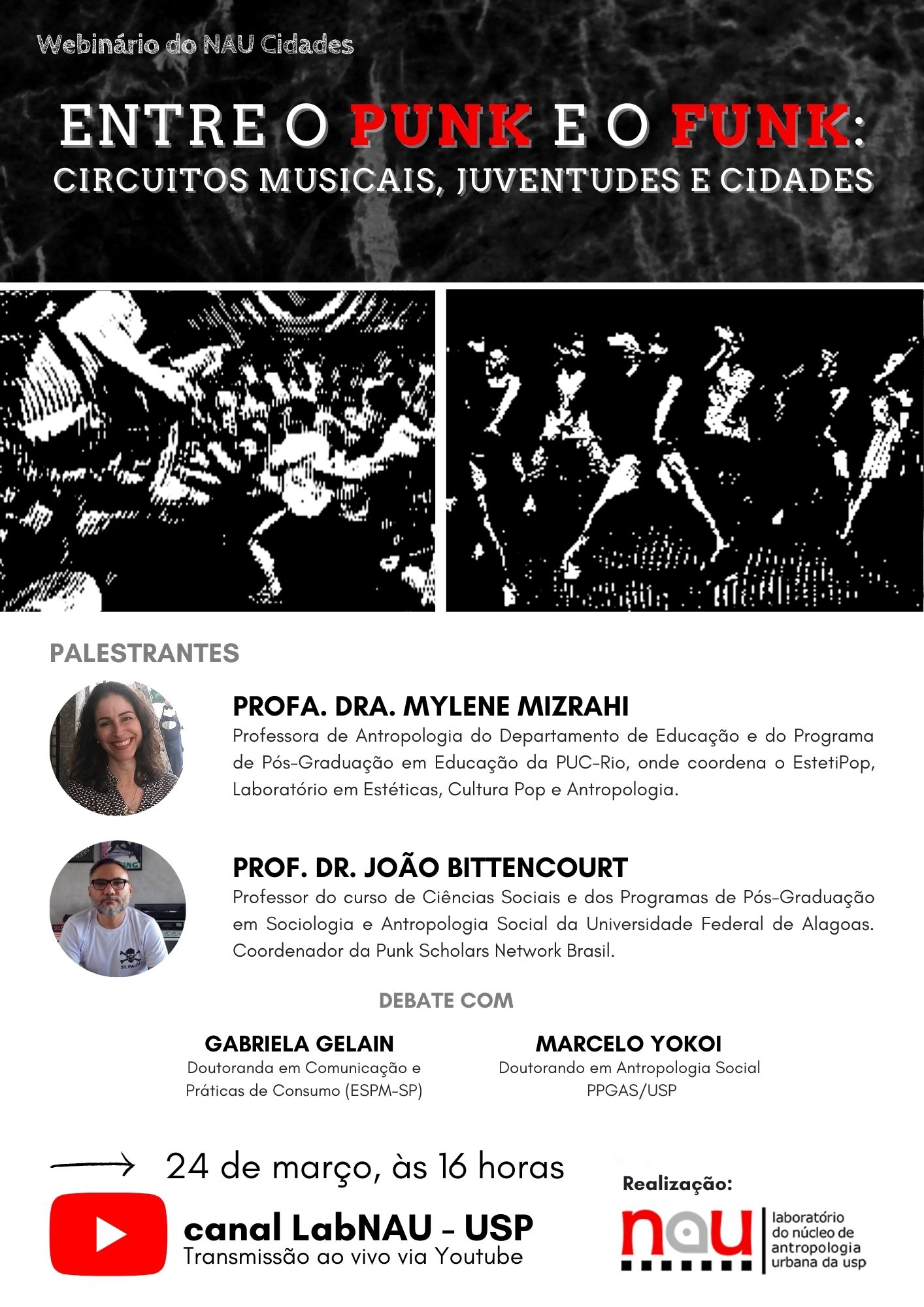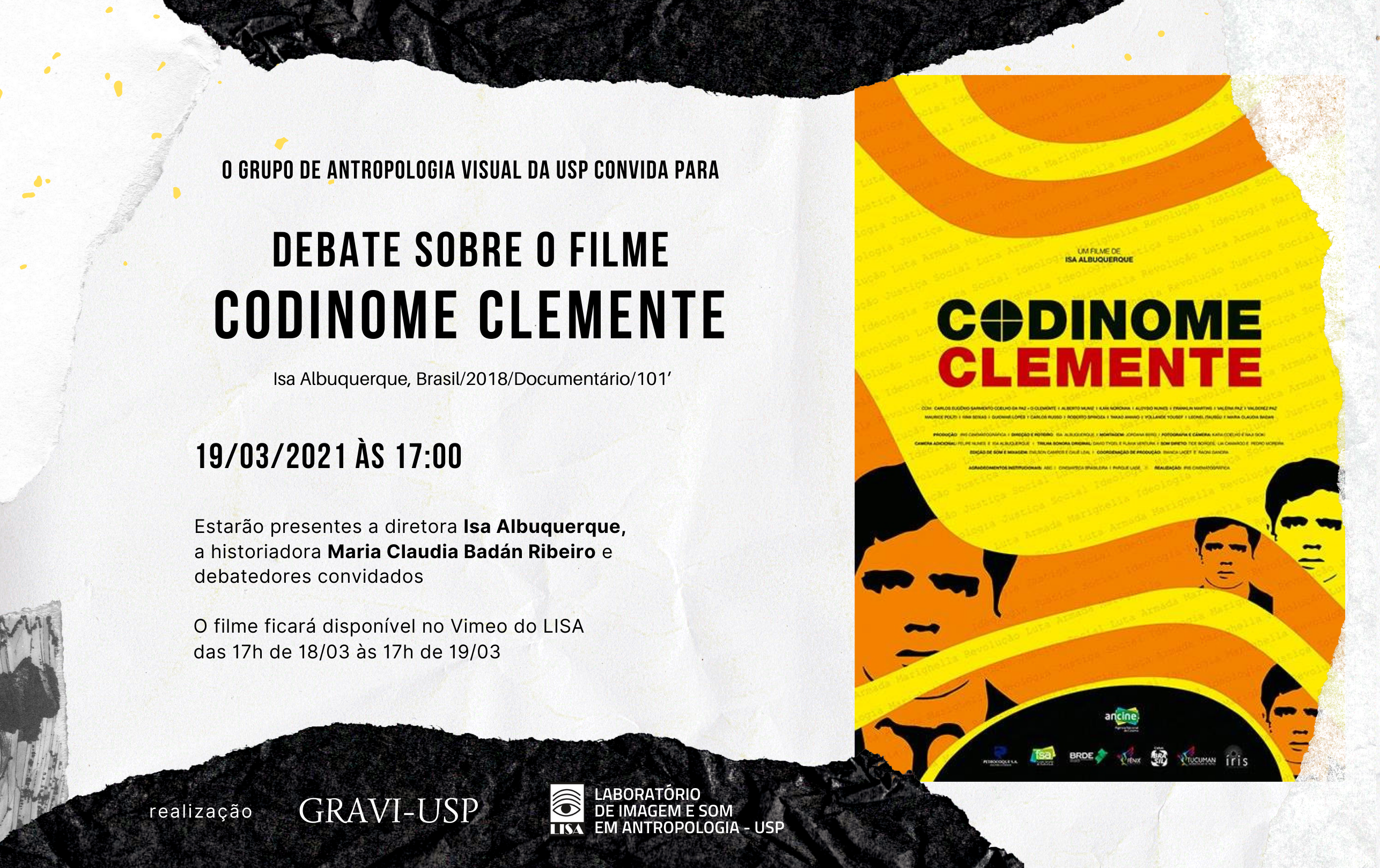History Events DA
NAU/USP June Webinar.
Centralities of São Paulo: the urban in dispute
Speakers:
• Prof. Dr. Heitor Frúgoli Jr. (USP);
• Prof. Dr. Giancarlo Machado (State University of Montes Claros - MG).
Debate with:
• Bianca Siqueira M. Domingos (PhD in Urban and Regional Planning at UNIVAP);
• Sâmia Graziela P. de Souza (master's student in Anthropology from PPGAS/USP).
Date: June 30, 2021, Wednesday.
Time: 4 p.m.
Location: LabNAU-USP channel on Youtube.
address:https://www.youtube.com/channel/UCOW7GQI1hv26z6q3TIkZzwQ
Anthropology Congress UAB / USP
This congress aims to reflect on social and political events that are currently shaking local and global realities: social transformations, forms of protest, political positions (although silenced), conceptual articulations and different perspectives in relation to established systems. All of this in order to understand the present political moment from new anthropological perspectives. This meeting is aimed at young researchers (master) and doctorate in Anthropology, from the Universitat Autònoma de Barcelona and from the University of São Paulo, who have advanced research.
Schedule:
Submission of abstracts: 14.05.2021 (300 words. 5 keywords)
Proposals accepted: 21.05.2021
Submission of papers: 11.06.2021 (8 to 10,000 words)
Communications and texts may be in Spanish, Portuguese or English.
All emails should be sent, simultaneously, to: Silvana Nascimento (silnasc@usp.br) and Virginia Fons (virginia.fons@uab.cat).
Speakers:
• Lígia Ferro (University of Porto / Portugal);
• Enrico Spaggiari (NAU / GEAC / USP).
Debate with:
• Bárbara Côrtes Loureiro (master's student in Social Sciences at UNIFESP);
• Michel de Paula Soares (doctoral student in Anthropology at PPGAS / USP).
Coordination:
• Prof. Dr. Giancarlo Machado (State University of Montes Claros-MG);
• Prof. Dr. José Guilherme Magnani (USP).
Date: May 27, 2021, Thursday.
Time: 10:30 am (BR) / 2:30 pm (PT).
Location: LabNAU-USP channel on Youtube.
Address:
Simone Toji - Unesp-Marília / IPHAN
Maurício Alcântara - Master in Anthropology from PPGAS / USP
Orlando Elorza Guzmán - UAM-I / USP
Mediation:
Cristina Patriota de Moura - UNB
The concept of cosmopolitanism has been gaining space within the debates that problematize the articulation between global and local processes. Based on research experiences involving the city of São Paulo and Mexico City, the seminar aims to discuss the variety of existing approaches based on the concept of cosmopolitanism, which go beyond the elitist and exclusive sense usually attributed to the term, to point out possibilities for reflection within the field of urban studies.
Promoted by the Center for Amerindian Studies of the University of São Paulo, CEstA-USP, and supported by the Permanent Commission for Affirmative Actions of the Graduate Program in Social Anthropology at the University of São Paulo, COPAF / PPGAS-USP, the event will bring together about thirty indigenous scholars from all regions of Brazil to discuss their research and life trajectories, covering the most varied themes and contexts. With a multiple purpose, an attempt is made to establish a reception space for the new indigenous members of the PPGAS / USP, allowing, since their entry, connections with indigenous researchers from other regions. The cycle is combined with other events that make up the activities of the indigenous April throughout the country, helping to make the presence and protagonism of indigenous peoples in academic spaces more and more constant. Program available on the CEstA-USP website (https://cesta.fflch.usp.br/node/1507)
Webinar of the Urban Anthropology Nucleus of USP.
Address: https://www.youtube.com/channel/UCOW7GQI1hv26z6q3TIkZzwQ
Urban narratives: images of the city
Speakers:
• Profa. Dra. Ana Luiza Carvalho da Rocha (UFRGS / FEEVALE);
• Prof. Dr. Jesus Marmanillo Pereira (UFMA).
Debate with:
• Diana Paola Gómez Mateus (doctoral student in Anthropology at PPGAS / USP);
• Alexsânder Nakaóka Elias (postdoctoral fellow at the Visual Anthropology Nucleus at UFRGS).
Coordination:
• Prof. Dr. Giancarlo Machado (State University of Montes Claros-MG);
• Prof. Dr. José Guilherme Magnani (USP).
The seminar "Museums, Heritage and cities: Crítica decolonial na pandemic", with the participation of Julio Talhari (PhD student in Social Anthropology, PPGAS-USP), Thais Waldman (postdoctoral student at Museu Paulista), and Renata Montechiare (professor at Flacso Brasil), will take place on The GEAC YouTube, with the participation of Julio Talhari (PhD student in Social Anthropology, PPGAS-USP), Thais Waldman (postdoctoral student at the Museu Paulista), and Renata Montechiare (professor at Flacso Brasil): https://linktr.ee/geac
The first 2021 edition of Gender & Inequalities + Health - Debates brings to discussion the relationship between fat bodies and covid-19 pandemic. In this sense, we propose to discuss the issue from three axes: stigmas and stereotypes, activism and resistance. In this debate, the participants are:
MALU JIMENEZ - is fat, feminist philosopher, artifer. He makes art by proposing a new look at fat bodies. PhD professor in Contemporary Culture Studies at UFMT, PHD in fatphobia, author of the book "fight like a fat: fat phobia, resistance and activism".
MARCELLE SILVA - Post-doctoral student in Psychology (UFC); Substitute Professor, Department of Social Sciences of ufc; Deputy Coordinator of the Research Center on Sexuality, Gender and Subjectivity (NUSS /UFC); Coordinator of Pesquisa Gorda - Transdisciplinary Studies Group of Gordes Corporalities in Brazil.
MIRANI BARROS - Nutritionist, researcher of fat body, master in collective health, professor of and collective health at UFRJ/Macaé.
Mediation:
Between punk and funk: musical circuits, youth and cities
NAU / USP Webinar
Speakers:
• Profa. Dr. Mylene Mizrahi (PUC Rio);
• Prof. Dr. João Bittencourt (UFAL).
Debate:
• Gabriela Gelain (doctoral student in Communication and Consumer Practices at ESPM);
• Marcelo Yokoi (doctoral student in Anthropology at PPGAS / USP).
Date: Wednesday, March 24, 2021.
Hours: 16 hours.
Location: LabNAU's YouTube channel.
Address: https://www.youtube.com/channel/UCOW7GQI1hv26z6q3TIkZzwQ
A conversation-debate with director Isa Albuquerque and historian Maria Claudia Badán Ribeiro about the film CODINOME CLEMENTE (Brazil / 2018 / Documentary / 101 ’)
To liven up the debate, we will have professors Esther Hamburger (Cinema-ECA / USP), Osvaldo Luis Angel Coggiola (História / USP) and Wilson do Nascimento Barbosa (História / USP).
Live broadcast of the debate:


